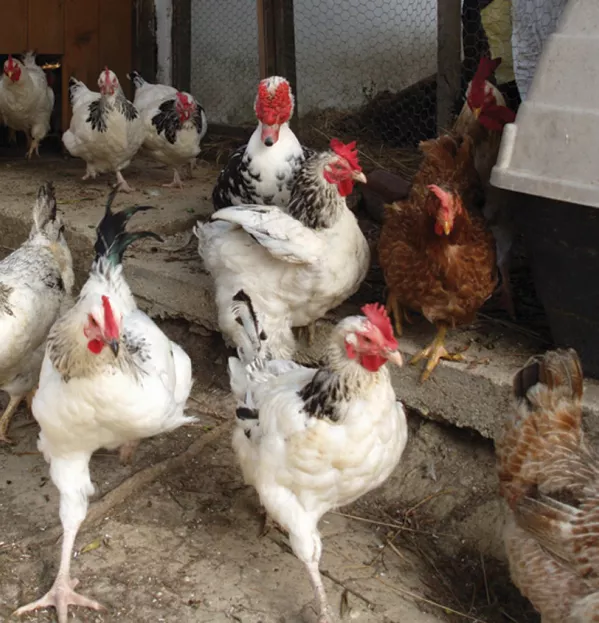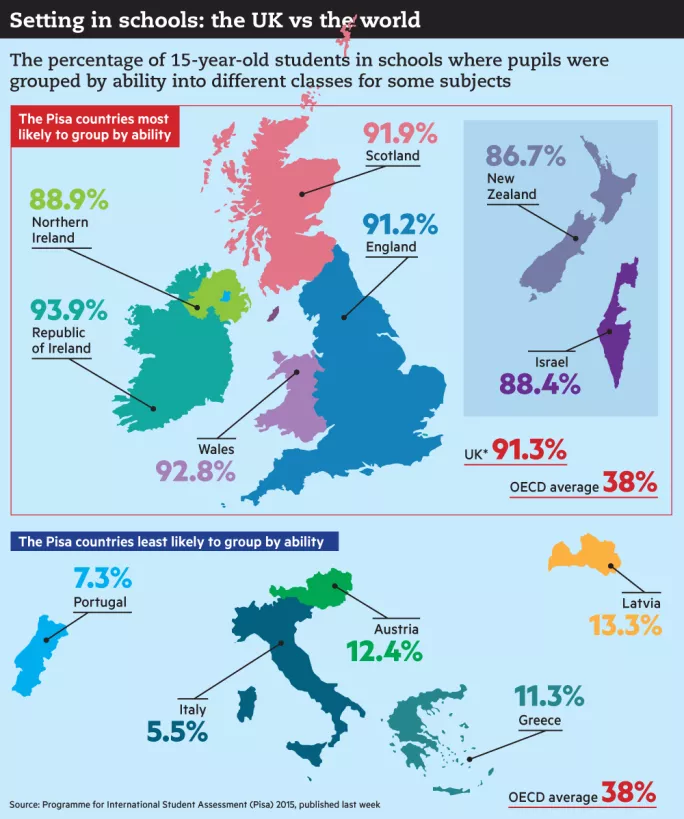
Setting ‘puts Scotland’s poor at a disadvantage’

Pupils in Scottish secondaries are more likely to be grouped by ability than those in almost any other western country outside of the UK, new figures show, prompting one leading academic to warn that the practice puts poorer pupils at a “double disadvantage”.
An inclusion expert has also warned that grouping by ability is now increasingly common in Scottish primary schools - just as the government is striving to “close the attainment gap” between the most and least well-off pupils.
Although Scotland has among the least academically selective school admissions systems in the world, last week’s Programme for International Student Assessment (Pisa) results show that almost 92 per cent of Scottish secondaries grouped students by ability for “some subjects”. This compared with an average of 38 per cent across member nations of the Organisation for Economic Cooperation and Development (OECD), which runs Pisa.
Grouping by ability within classes for some subjects is also more likely to take place in Scotland - 85.7 per cent against an OECD average of 50.5 per cent.
Professor Becky Francis, director of University College London’s Institute of Education, said that grouping by ability caused the lowest attainers - who tended to come from disadvantaged backgrounds - to perform significantly worse than if they were placed in mixed-ability classes. She also hit out at the “cultural assumption or myth” that it is harder to teach mixed ability.
Professor Francis told TESS: “Given that kids from disadvantaged backgrounds tend to be overrepresented in these [lower] sets and streams, the disadvantage is doubled because they come into the system behind their more affluent peers and then are subject to practices that we know will have a detrimental impact on their progress and educational outcomes.”

‘Very detrimental effect’
Professor Sheila Riddell, an inclusion expert at the University of Edinburgh, said that setting was fine for children in top groups, who would largely be from middle-class backgrounds, but had a “very detrimental effect” on lower groups, likely to be from poorer backgrounds.
“Setting has the effect of promoting social class differences rather than eroding them,” she said. “My impression is that primary schools in Scotland do a lot of setting by ability, placing children in different groups for reading and maths, which is going to depress the expectations of children from poorer backgrounds right from the start.”
Professor Francis, who is leading a major research project into the issue of setting involving 140 secondaries said that the problem with grouping by ability is not just the impact on the confidence and self-esteem of the pupils who find themselves in the bottom classes.
Lower-ability classes, she said, tend to be assigned worse teachers, expectations tend to be low, courses are less demanding and there is often little movement between classes.
Mixed-ability teaching was common in subjects like geography and history, thus proving it can be done, she said.
‘Setting has the effect of promoting social class differences’
Professor Francis added: “If you just assume you are teaching a homogenous group, all the same level, you could end up teaching lazily and poorly to the middle of that group.
“Teachers should always be differentiating their practice because there will be different levels of attainment in the class and the nuance of talents in different areas of a subject. Unless these factors are taken into consideration, the teaching will not be of a high quality.”
Andrea Bradley, assistant secretary of the EIS teaching union, said pupils should be taught in mixed-ability groupings as far as possible. But this practice has not taken off in Scotland because some form of selection has been the norm for generations and no real consensus has been reached about “the justness of teaching mixed ability”. Resourcing is also an issue, given that mixed-ability classes work best with fewer pupils, she added.
“High-quality mixed-ability learning has to be properly resourced,” said Ms Bradley. “Part of the reason Scotland has not embraced this to the same degree as other countries is because there has not been the determination by government to resource it.”
A Scottish government spokesperson said that ministers were “fully focused” on closing the attainment gap but setting arrangements were “up to individual schools” depending on “young people’s learning needs”.
They added: “Inspections show that neither setting nor mixed ability is an indicator of whether young people will have good learning experiences. What matters is whether they are receiving the right level of support and challenge to attain as highly as possible.”

You need a Tes subscription to read this article
Subscribe now to read this article and get other subscriber-only content:
- Unlimited access to all Tes magazine content
- Exclusive subscriber-only stories
- Award-winning email newsletters
- Unlimited access to all Tes magazine content
- Exclusive subscriber-only stories
- Award-winning email newsletters
You need a subscription to read this article
Subscribe now to read this article and get other subscriber-only content, including:
- Unlimited access to all Tes magazine content
- Exclusive subscriber-only stories
- Award-winning email newsletters
- Unlimited access to all Tes magazine content
- Exclusive subscriber-only stories
- Award-winning email newsletters